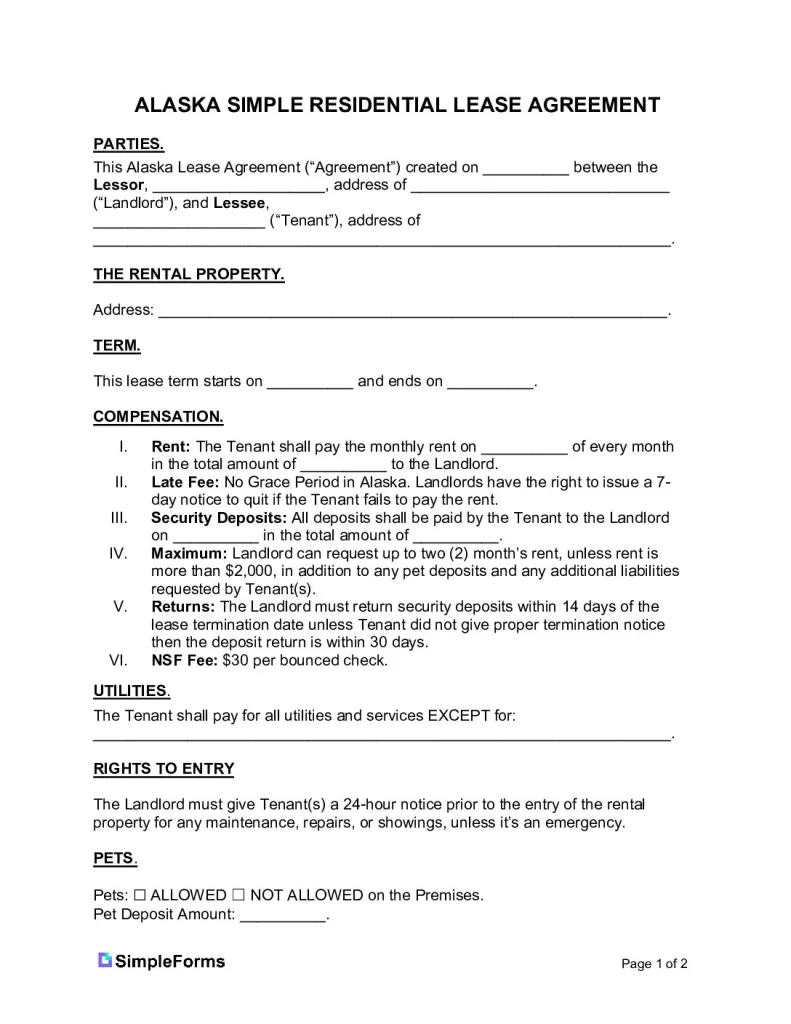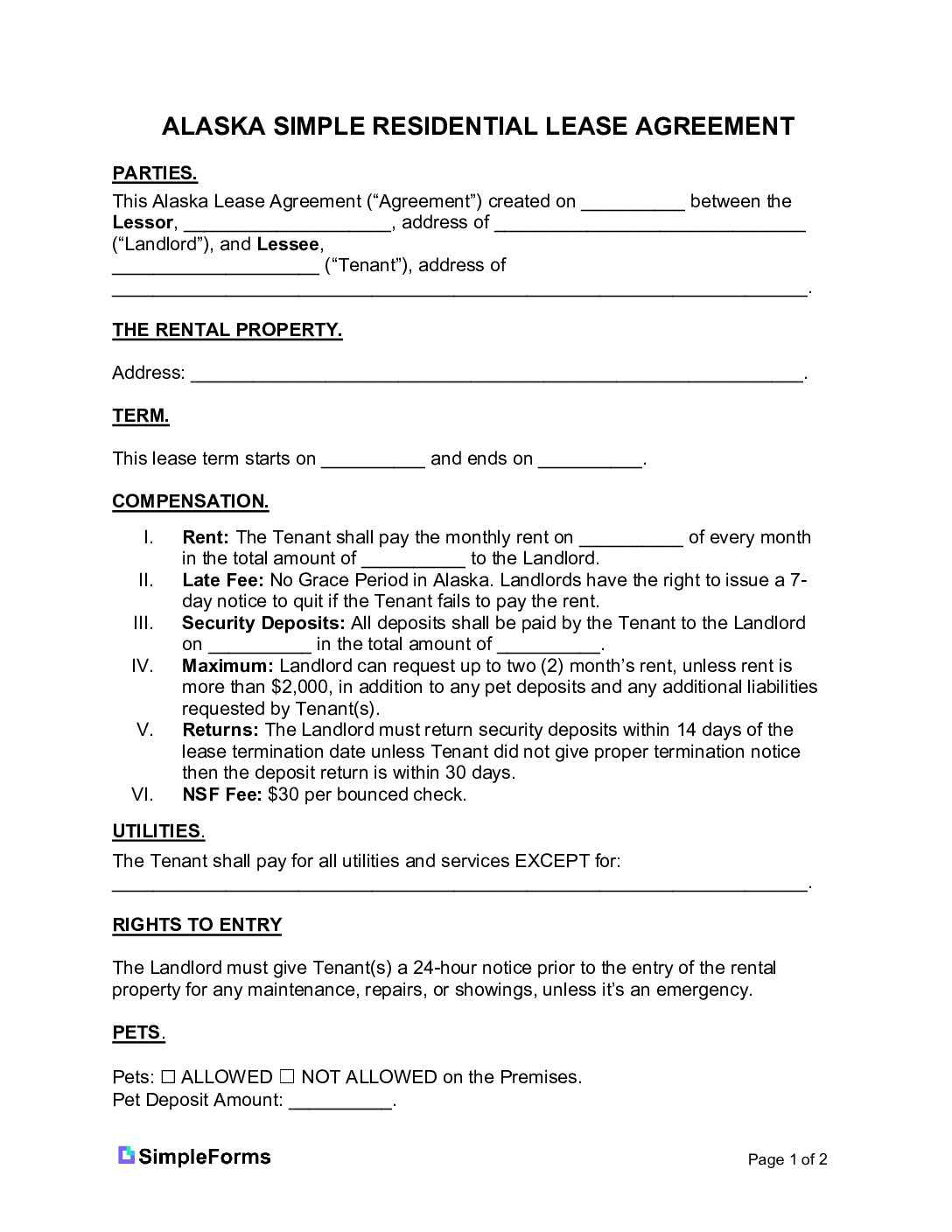An Alaska 1-Page Lease Agreement Template is used to legally establish a rental relationship between landlords and tenants in the state of Alaska.
Quick Download Links
- Alaska Lease Agreement PDF Template – Official State Form
- Alaska Deposit Receipt Template – Required Documentation
- Alaska Rental Application Form – Pre-lease Screening
Alaska Real Estate Market Facts (2025)
- Average Home Price: $293,000
- Real Estate Agent Average Salary: $63,720 annually
- Property Tax: Yes, varies by municipality
- Alaska Permanent Fund: Residents receive annual dividends
Source: Zillow.com
Alaska 1-Page Lease Agreement Landlord-Tenant Laws: What You Must Know
Alaska landlords and tenants must comply with the Alaska Uniform Residential Landlord and Tenant Act. This comprehensive legislation governs all rental relationships in Alaska and provides the legal framework for lease agreements.
Federal Laws Affecting Alaska Rentals
Your Alaska lease agreement must also comply with these federal regulations:
- Fair Housing Act – Prevents discrimination
- Fair Credit Reporting Act (FCRA) – Governs tenant screening
- Americans with Disabilities Act (ADA) – Accessibility requirements
- Lead-Based Paint Disclosure – Required for pre-1978 properties
Major Alaska Cities Rental Comparison
| City | 1-Bedroom Avg | 2-Bedroom Avg | Security Deposit Avg |
|---|---|---|---|
| Anchorage | $1,350 | $1,650 | $2,700 |
| Fairbanks | $950 | $1,200 | $1,900 |
| Juneau | $1,100 | $1,400 | $2,200 |
| Wasilla | $900 | $1,150 | $1,800 |
| Kenai | $850 | $1,100 | $1,700 |
What to Include in a Alaska 1-Page Residential Lease Agreement Form?
Required Disclosures
- Landlord’s Contact Information – Alaska law (AS § 34.03.080) requires landlords to provide the name and address of the person authorized to manage the property and receive legal notices.
- Lead-Based Paint Disclosure – For properties built before 1978, federal law mandates that landlords disclose any known presence of lead-based paint. This includes providing tenants with a lead hazard information pamphlet and a disclosure form.
Security Deposits
- Maximum Limit – Landlords can charge a security deposit not exceeding two months’ rent (including pet deposits if applicable).
- Returning – Upon termination of the lease, the landlord must return the deposit within 14 days. If the landlord deducts money from the deposit for damages, the landlord has 30 days to return the remaining amount.
- Withholding – Within 14 days of receiving the deposit, landlords must provide tenants with a written notice explaining the conditions under which they may withhold all or part of the deposit.
Source: § 34.03.070
Landlord Access
- General Access/Legal Notice – Landlords must provide reasonable written notice (typically 24 hours) before entering the rental unit for non-emergency purposes, except in abandonment cases.
- Emergency – In emergencies, landlords can enter without notice.
Paying Rent
Grace Period – There’s no grace period in the state of Alaska.
Reasons for Eviction
- Material Affecting Health and Safety – If a material defect occurs on the property, the Landlord must cure it within ten days after receiving notice from the Tenant. If it is not fixed within 20 days, the tenant can terminate the tenancy.
- Recurrence of Noncompliance – If a prior breach reoccurs within six months of the last breach, the tenant may terminate the lease with ten days written notice.
Source: § 34.03.160
Repairs and Maintenance
- Who is responsible – The Landlords are responsible for maintaining the property in a habitable condition. Tenants must notify landlords in writing of any necessary repairs or issues with the property.
- Time Frame – The law does not require the Landlord or Tenant to fix a condition in a specified time.
Source: § 34.03.100
Evictions
- Legal – Tenant has seven days to pay rent in full after receiving notice of nonpayment from the Landlord. If rent still goes unpaid, the tenancy terminates unless the Landlord agrees to extend.
- Illegal – Do-it-yourself eviction methods, such as changing locks or shutting off utilities, are unlawful.
Source: § 09.45.090 – § 09.45.105
Common Alaska Lease Agreement Mistakes to Avoid
❌ Critical Errors That Cost Money
- Incorrect Security Deposit Amount
- Mistake: Charging more than 2 months’ rent
- Consequence: Potential legal penalties and forced refund
- Solution: Calculate total including pet deposits
- Missing Lead Paint Disclosure
- Mistake: Forgetting federal requirement for pre-1978 properties
- Consequence: $11,000+ federal fines
- Solution: Always include EPA form
- Inadequate Entry Notice Procedures
- Mistake: Not specifying 24-hour notice requirement
- Consequence: Tenant privacy violations, legal disputes
- Solution: Detail exact notice procedures
- Vague Maintenance Responsibilities
- Mistake: Unclear who handles what repairs
- Consequence: Disputes over repair costs
- Solution: Specific maintenance clause breakdown
Alaska Lease Agreement Checklist
✅ Before Signing Checklist
Landlord Preparation:
Tenant Preparation:
✅ After Signing Checklist
Immediate Actions (First 24 Hours):
First Week Actions:
Frequently Asked Questions: Alaska Lease Agreements
Legal Requirements and Compliance
Q: Can landlords increase rent in Alaska?
A: Yes, Alaska has no rent control laws. Landlords can increase rent to any amount with proper notice (typically 30 days for month-to-month leases). However, increases cannot be discriminatory or retaliatory.
Q: What is the maximum security deposit in Alaska?
A: The maximum security deposit cannot exceed two months’ rent, including any pet deposits. This is one of the higher limits in the U.S., providing good protection for landlords.
Q: How long do landlords have to return security deposits in Alaska?
A: Landlords must return security deposits within 14 days if no damages occur, or within 30 days if deductions are made. Interest is not required to be paid on deposits.
Q: Is there a grace period for rent in Alaska?
A: No, Alaska does not have a statutory grace period for rent payments. Rent is due exactly when specified in the lease agreement.
Q: What notice is required for landlord entry in Alaska?
A: Landlords must provide 24 hours written notice before entering rental units, except in emergencies. The notice must specify the purpose and approximate time of entry.
Regional and Climate Questions
Q: When did Alaska become a state?
A: Alaska became the 49th U.S. state on January 3, 1959.
Q: What is Alaska’s capital city?
A: Juneau is the capital of Alaska.
Q: What time zone is Alaska in?
A: Alaska uses Alaska Time Zone (AKT) and Alaska Daylight Time (AKDT) during daylight saving time.


